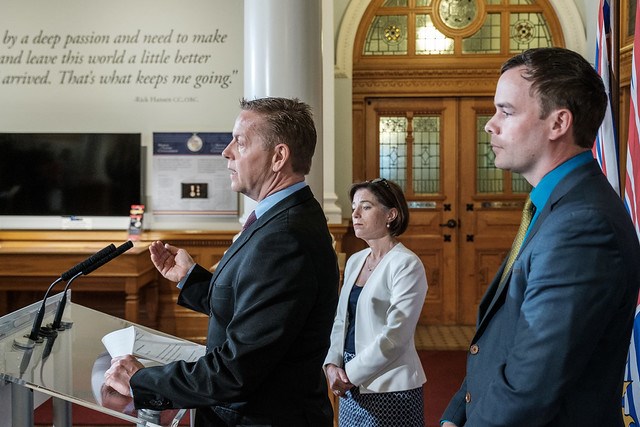The Province of British Columbia is cracking down on landlords and renters who break tenancy laws by setting up a compliance and enforcement unit within the Residential Tenancy Branch (RTB), housing minister Selina Robinson announced at a media conference in Victora May 8.
Responding to , the role of the RTB’s enforcement unit will be to conduct investigations into repeat or serious offenders who break tenancy laws or fail to meet their contractual obligations.
Minister Robinson said, “What the rental housing task force heard from both renters and landlords is that too many people feel there are no repercussions for breaking tenancy law. That’s changing thanks to our new compliance and enforcement unit. When we hear about landlords who send out five, six, seven eviction notices to all their tenants for cosmetic upgrades, those landlords will hear from us. And when we hear about renters who scam landlords out of months of rent and then move on, those renters can expect a call as well.”
Scott McGregor has been appointed director of the enforcement unit, which currently comprises five staff members who have been working together for five weeks so far. The province said that the new team already has 21 active investigations and recently issued its first administrative penalty against a landlord.
Minister Robinson said that fines for repeated non-compliance could run to as much as $5,000 a day.
McGregor – whom Robinson dubbed “The Enforcer” – said, “The compliance unit is not the first stop [for people having a dispute with their landlord or tenant], as the RTB’s dispute resolution is often very effective. The compliance unit is reserved for those who feel the law doesn’t apply to them.”
Robinson added that since the NDP had started its housing reform program, call wait times at the RTB had fallen from an average of 45 minutes to five minutes.
Education program on tenancy laws
The province also announced a new public education program on residential tenancy laws. The housing ministry said in a statement, “The goal is to provide improved awareness for renters and landlords on their rights and responsibilities, which will reduce the number of cases ending up in arbitration. This enhanced public education will be supported through new funding to Landlord BC and the Tenant Resource and Advisory Centre. Additional public education will focus on rules around renovictions, including new policy guidelines introduced last year, to help clarify the many situations when ending a tenancy would be unnecessary or illegal, and the limited situations when a rental unit needs to be vacant for renovations.”
Spencer Chandra Herbert, chair of the Rental Housing Task Force, said, “Sometimes just getting information is enough to stop the bad behaviour. Renters and landlords told us that, in many cases, problems could have been avoided if people had known their rights and responsibilities.” He cited the case of a landlord in Kelowna who had sent out eviction notices due to renovations, who was informed that this was not allowed and removed the eviction notices.
The ministry said that with phase one work on implementing the Rental Housing Task Force recommendations under way, “Phase 2 work will include further actions by the end of 2019. Recommendations that require legislative changes, additional resources, stakeholder consultations or policy work, such as [changing laws on] rental restrictions in strata units, will be considered as part of Phase 3, with actions to come in 2020.”



